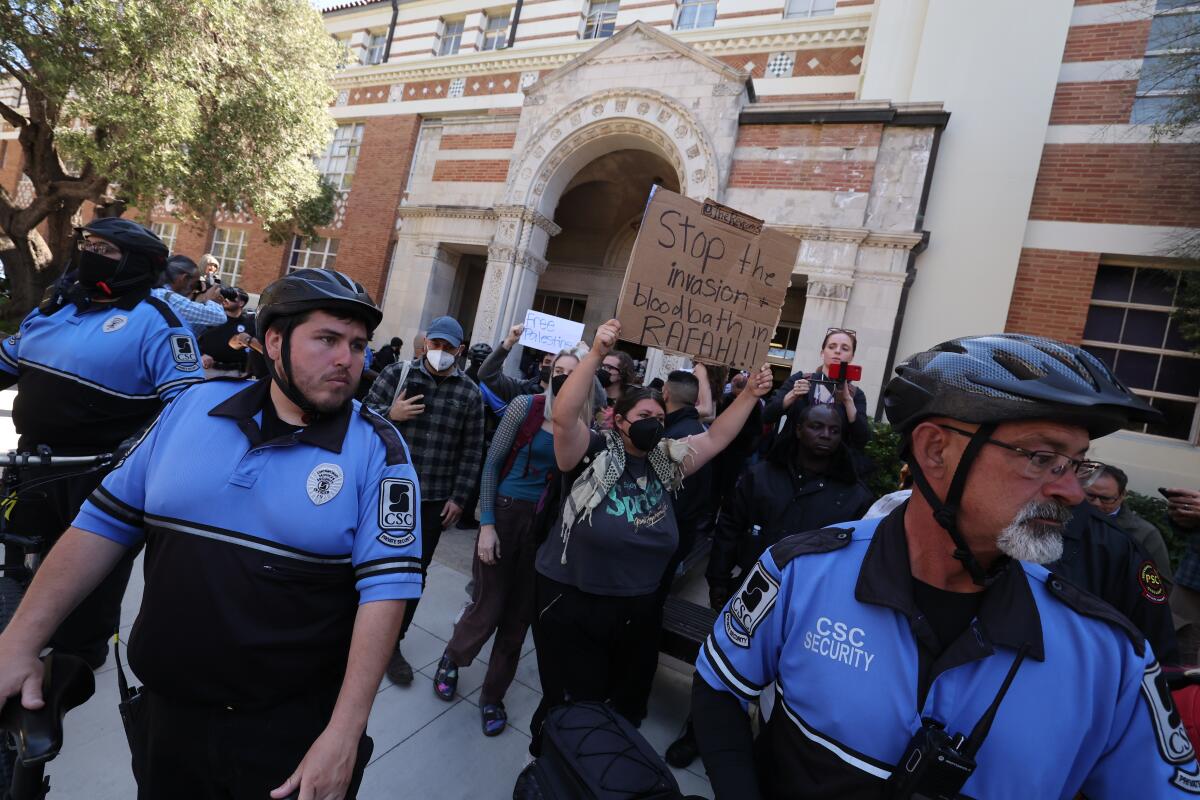Column: MAGA loves Gaza protests on campus. Here’s why

Happy Tuesday. There are 181 days until the election, and Joe Biden’s dog Commander has been moved to a safehouse until Kristi Noem calms down.
In case you missed it, the puppy-shooting South Dakota governor has set her sights on the president’s German Shepherd, seemingly not content with the disastrous media coverage around the story of putting a bullet in her own pup, Cricket.
You're reading the L.A. Times Politics newsletter
Anita Chabria and David Lauter bring insights into legislation, politics and policy from California and beyond. In your inbox three times per week.
You may occasionally receive promotional content from the Los Angeles Times.
Don’t get me wrong, Commander has taken a chunk out of at least two dozen Secret Service agents. Bad dog, bad.
But over the weekend, Noem suggested that if she had her way, she’d kill Commander. Which, again, seems extreme and psychotic.
I do not know who is giving her advice, but it is very bad advice.
Bad PR people, bad.
And now on to other bad things — like MAGA capitalizing on Gaza protests.
If you’ve been getting your news about protests on college campuses from this publication or anything rational, you’ve probably been thinking about the complicated lines between free speech and chaos, peaceful protest and unleashed hate.
The small sliver of agreement, if any is to be found in this fraught moment, is that this social upheaval in the United States is complicated and complex.
Unless you’re a MAGA type, and get your news from Fox, Truth Social or the like.
Then this whole thing is super simple and kind of makes you happy: We told you liberal schools are destroying America. Here’s the proof!
Here’s why that matters.
Why MAGA loves Gaza protests
Strongmen need something to be strong about.
Headlines across MAGA media — which I read so you don’t have to — are delighting in the protests because they seem out of control.
“Campus tumult highlights risk of reckless immigration policies” reads a Washington Times headline. “Does Columbia Want to Elect Donald Trump?” asks a National Review piece.
Trump Republicans are eager to make their own news off that.
House Speaker Mike Johnson (R-La.) visited Columbia University to talk about how terrible everything is.
Rep. Lauren Boebert (R-Colo.) made her stop at George Washington University, where she ripped down a Palestinian flag and said, “This is America, and that s— needs to come down,” according to video shot by freelance reporter Andrew Leyden.
Rep. Virginia Foxx (R-N.C.), chair of the House Education Committee, has called on university heads from UCLA, Yale and others to testify about the protests and antisemitism on campus.
Brian Levin, founder of the Center for the Study of Hate and Extremism and professor emeritus at California State University San Bernardino, told me it’s true that both antisemitism and anti-Muslim hate crimes are off the charts right now.
Antisemitic hate crimes in the 10 largest U.S. cities have increased by double digits three years running, according to his research drawn from police data. In addition, what happened with counterprotesters at UCLA, he said, was part of a trend of increasingly open hate-based violence.
Those hate crimes, of course, are separate from protests about the carnage in Gaza.
But not in MAGA world, which has been quickly and efficiently convincing its base that chaos and maybe even terrorism are taking over and only Republicans can stop it.
“It’s clear that many of these people who pronounce themselves to be protectors are oftentimes just exploiters,” Levin said.
There is even some “happiness” among far-right extremists that the fallout of the Israel-Hamas war has landed on liberal college campuses because it gives MAGA Republicans an excuse to “plant their flag in the heart of liberalism at Columbia and UCLA,” he added. “These horrible people who come onto campuses to encourage more division are doing so when students both Jewish and Muslim are experiencing generational grief.”
But it is hardly unexpected.
The anti-schools party
It’s no secret that MAGA Republicans are anti-education, for themselves and others — remember Secretary of Education Betsy DeVos, who was one of the first Trump Republicans to use her power to break down protections for LGBTQ+ students and children of color?
Public K-12 education and higher education have been targets since Trump’s first run for the White House. But in recent years, the far right has worked hard to amp up that fear that public schools are actually bad for kids, family and society.
The easy answer for why is a culture war trope — public schools and universities “indoctrinate” kids into being “woke.”
But those who study democracies — and their decline — will tell you that is cover for something much more serious: The erosion of institutions that hold trust and power, be it the ranks of public school teachers or the ivory towers of higher learning.
Without institutions that are trusted, society gets scary and truth dissolves — making the revoking of civil liberties seem required if not necessary to preserve order.
As much as we are comparing the campus protests to those of the 1960s, the Republican response can be seen in something much more recent.
Think back to 2020 after George Floyd was murdered and Trump promised a military crackdown on civil unrest.
“These are not acts of peaceful protest. These are acts of domestic terror,” Trump said at the time, language being recycled for these Gaza protests. “[O]ur nation has been gripped by professional anarchists, violent mobs, arsonists, looters, criminals, rioters, antifa, and others.”
Even California called out the National Guard, setting up chain link fencing around the Capitol and rolling tanks through the streets of Sacramento.
Trump’s base loved that authoritarian response.
So while the Gaza protests are largely contained to campuses, the far-right Republicans see them as a way to harness that same enthusiasm for law and order.
“They are using this as organizing grounds,” Cihan Tugal told me. He is a professor of sociology at UC Berkeley who studies countries including Hungary and India whose democracies have eroded.
He believes the U.S. has a long way to go before such decline can happen here, in a large part because the far right doesn’t have the organizational structure and reach.
Right now, Trump is a “free floating autocrat” who relies on provocation and the energy of social media, rather than say, military backing or societal violence.
But it doesn’t mean we aren’t moving toward that. Tugal sees danger in a second Trump term, if the far-right comes through on its organizing.
Tugal said he also sees “potential for a bigger merger between the mob and some of the Republican leaders,” in the Gaza protests, a combination that could be troubling if it solidifies.
Summer is coming
Will any of it mean anything for the election with summer on the horizon and many campuses clearing out?
Maybe not, though if the worst were to happen and the Israel-Hamas conflict drags on, it could.
But it is an inflection point for universities facing this relentless right-wing campaign against their very existence.
UCLA failed on multiple fronts by allowing counterprotesters to turn into a violent mob with no intervention. USC similarity did not, as our governor likes to say, meet the moment.
But while our attention is focused on the protests, it’s imperative we understand that there is another fight happening — the campaign by Trump Republicans to hobble universities, institutions crucial to both democracy and civil rights.
What else you should be reading
The must-read: Gaza Isn’t Root of Biden’s Struggles With Young Voters, Polls Show
The “Don’t retire quite yet”: Social Security and Medicare finances look grim as overall debt piles up
The L.A. Times Special: More than 100 arrested at UCLA, UC San Diego as campuses step up security
Stay Golden,
Anita Chabria
P.S.: Here’s The Times’ look at the best of the Met Gala, co-chaired by Oakland’s own Zendaya.

—
Was this newsletter forwarded to you? Sign up here to get it in your inbox.
Get the L.A. Times Politics newsletter
Deeply reported insights into legislation, politics and policy from Sacramento, Washington and beyond. In your inbox three times per week.
You may occasionally receive promotional content from the Los Angeles Times.




